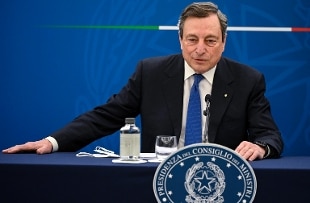Share
April 25, 2021 "Less than three months into Prime Minister Mario Draghi's government of national unity, not only is Rome's voice heard loud and clear in Paris and Berlin, it is increasingly setting the agenda as the EU tries to get out of the Covid-19 pandemic ".
This is what the Financial Times writes in an analysis dedicated to Italy which, according to the authoritative British economic newspaper, has become a "European model", also thanks to the close ties of the new Prime Minister with Paris and Berlin which "redesign relations of the EU ". While not hiding the risk feared by some "that expectations about what Draghi can realistically achieve have already become too high", the Financial Times opinion appears to be largely positive.
A credit opening which, according to the financial newspaper, appears to be shared by the markets: "often worried about the size of the Italian public debt, for now they remain indifferent, a sign of trust in the new prime minister" on the eve of the presentation of the Recovery plan.
As regards foreign policy, the Financial Times also welcomes the decision to block vaccine exports, "a risky move" which was then "quickly supported by Paris" and "provided political cover to the president of the commission Ursula Von. der Leyen ". Just as the exit against Turkish President Recep Tayyip Erdogan is evaluated positively: "while other European leaders have remained largely silent, Draghi harshly criticized Erdogan, arousing anger in Turkey but diverting attention from the diplomatic incident of 'EU ", which had involved von Der Leyen and the president of the European council Charles Michel.

